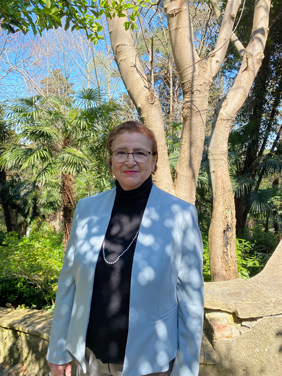The Japan Foundation Award 50th Anniversary Messages from Previous Awardees - Ayşe Selçuk ESENBEL

2007 The Japan Foundation Special Prize
Emeritus Professor, Bogazici (Bosphorus) University / President, Japanese Studies Association
Ayşe Selçuk ESENBEL
[Turkey]
I am emeritus Professor of Japanese history at Bogazici University, Istanbul, Turkiye (Turkey). Recently I have been working on publications related to modern Japan’s relations with the Turkish and Islamic world that I have investigated over the years. I continue to teach Japanese history and Japan related graduate courses at Bogazici University. Currently I am also cataloging and organizing a research library in the Asian Studies Center of Bogazici University for more than 2000 primary sources and secondary publications that I have collected over the years on the topic of modern Japan’s interaction with the Turkish and Islamic world that will be available for researchers in the future.
I congratulate the Japan Foundation on the occasion of its 50th Anniversary with much appreciation of its greatly valuable role in developing Japanese Studies in the international academy. I can confidently state that my role in this country as the pioneer of establishing the field of Japanese Studies and subsequently Asian Studies in Turkey could become reality only because of the Japan Foundation. When I received my first doctoral research award from the Japan Foundation back in 1976 as a Turkish graduate student studying Japanese history in Columbia University in the United States, there was no Japanese language instruction nor any academic frame for the study of Japan in Turkey. I was the first academic professional in the field of Japanese history and it was due to a simple case of “accidental coincidance”. Between 1963-1967, I had learned Japanese having studied in International Christian University of Japan because of my father’s diplomatic posting in Tokyo in the Turkish Embassy. After I graduated from Columbia with the Japan Foundation’s support in completing my doctoral research in Japan and returned to Turkey in 1982, I became a member of the Department of History Bogazici University in Istanbul and started teaching a year long survey course on Japanese history that I am still teaching, and founded the Japanese language program (the first in Istanbul) which became the core courses for the education of the first generation of Japanese Studies specialists in Istanbul. During 1986, since I was the only person in the country who had academic training in Japanese history, I was even sent on “loan” to Ankara University for one year to pioneer the newly established Department of Japanese Language and Literature in the Faculty of Letters so that it would be ready on the occasion of Prince Mikasa’s official visit to Turkey. To this date, I have continued to have close cooperative relations with the academic staff of the Ankara University program, having also served as the advisor of many of their doctoral dissertations.
By now, Bogazici University’s Japanese studies which has developed into a graduate program (M.A. and Ph.D. ) in Japanese history, and a new M.A. Program in Asian Studies Japan major has deeply familiarized thousands of Turkish students in Japanese affairs. Many have pursued professional careers working in Japan-Turkey related fields, or went on for Ph.D. program in Japan, Europe, and the United States. For many years, the Japan Foundation also contributed to the foundation of a Japan related referance library (a program which has been immensely valuable) at Bogazici University. It has become the best Japanese studies referense library collection in Turkey that provides open access for researchers in the country. The Japan Foundation is singularly responsible for the expansion of the Japanese Studies academic research field in Turkey, by providing support for 4 triannual conferences on Japanese Studies in Turkey that has been bringing together the large number of Japan specialists close to 40 academics who are working in many universities. The selected papers of the Conferences have been published in Turkish as “Turkiye’de Japonya Calismalari” with copies deposited in the Japan Foundation’s library in Tokyo.
I was greatly honored to have received the 2007 Japan Foundation Special Prizes for Japanese Studies. Needless to say, it has been a deeply meaningful award for me. Going over my professional life between 1976-2007, I can confidently state that if it was not for the Japan Foundation, there would have been no Japanese Studies field in Bogazici University which has become the center for the high quality Japanese language instruction in the country and the best social science focused graduate program in Japanese Studies. Indeed, it should be always remembered that the Japan Foundation has been singularly responsible for having developed Japanese studies in Turkish universities that today has emerged as the most advanced field of Japanese studies in the Middle East, East Mediterranean, and south east Europe, as well as Central Asia. Turkish students no longer need accidental encounters to study Japan. They can now study Japan in established academic institutions in a scholarly manner.
I sincerely hope that the Japan Foundation will continue its most important role in the future for enhancing the intellectual and cultural interaction at a high scholarly and scientific level between Japanese people and the international community that will contribute toward global peacefull understanding.
Ayşe Selçuk ESENBEL
(Original text in English)
The Japan Foundation Award / Special Prizes (2007) - Profile
- What We Do Top
- Arts and Cultural Exchange [Culture]
- Japanese-Language Education Overseas [Language]
- Japanese-Language Education Overseas [Language] Top
- Learn Japanese-language
- Teach Japanese-language
- Take Japanese-Language Test
- Know about Japanese-language education abroad
- The Japanese-Language Institute, Urawa
- The Japanese-Language Institute, Kansai
- Japanese-Language Programs for Foreign Specified Skilled Worker Candidates
- Japanese Language Education for Japanese Children Resident Overseas and for the Descendants of Migrants
- Archives
- Japanese Studies and Global Partnerships [Dialogue]
- JF digital collection
- Other Programs / Programs to Commemorate Exchange Year
- Awards and Prizes
- Publications
